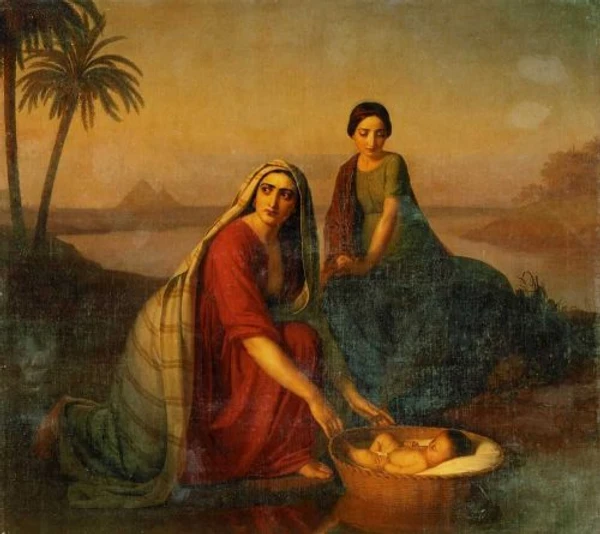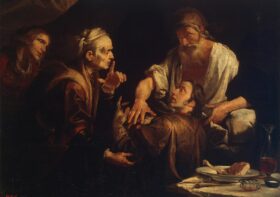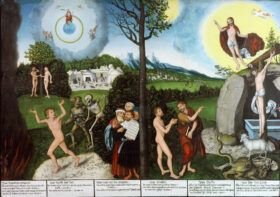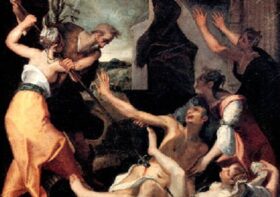From Glory to Glory

Moses’ Mother (1839-1842) by Alexei Tyranov
Parasha Shemot
01/09/2021
Shabbat shalom! Today’s parasha, entitled “Shemot”, spans Exodus 1:1 though 6:1.
Our reading begins in Egypt where we find that Joseph’s descendents have been fruitful, multiplying in number to the point of disconcertion for the new Pharaoh, who feared an alliance between foreign armies and the “exceedingly strong” Israelis. In his indifference to Joseph’s legacy of saving Egypt, Pharaoh enslaved God’s chosen people. He assigned taskmasters to ruthlessly oversee their work in brick and mortar and in the field.
We are told that the Israelis multiplied despite Pharaoh’s heavy hand. So, in a wicked act foreshadowing that of King Herod, he commanded the Hebrew midwives to kill all newborn males, and when they courageously disobeyed, he ordered all Hebrew boys be drowned in the Nile.
It took one brave woman, no doubt full of grace, to set in motion the liberation of Israel. Yocheved, the wife of Amram, hid her baby boy until his development forced her to send him down the Nile in a basket. To quote Freud, “The good mother necessarily fails.” That is, she sends her son into harm’s way that he might become the savior that defeats the evil. Yet this mother was not about to fail without a contingency plan; she sent her daughter to keep a watchful eye over his voyage. So, when Pharaoh’s daughter found him in the river, it was this older sister who suggested Yocheved rear the child while he nursed.
After he was weaned, Yocheved did the impossible for a second time, and returned the child to Pharaoh’s daughter, who named him Moses. Thus, Moses came of age in royalty, deep behind enemy lines. That is, until his nascent sense of justice compelled him to kill an Egyptian who was beating an Israeli. Of course, his sin was not long hidden, so he escaped Pharaoh’s wrath by fleeing to the land of Midian.
It was there that he rescued the daughters of the Midian priest Jethro from shepherds, earning him a room in Jethro’s home as well as the hand of his daughter Zipporah. One day, while shepherding Jethro’s flock, the Spirit of Adonai appeared to him at a mountain named Horeb, a place where heaven and earth intersected. God—made manifest in a burning bush—instructed Moses to deliver the Jewish people into the Promised Land. So, with his brother Aaron as his mouthpiece and his staff as the implement of divine power, Moses and his family left for Egypt.
On his way, God confronted them with Moses’ unsettled, in-house business. After all, how can a man lead a nation before first setting straight his own family? Moses was struck by God and nearly died, only spared after the proper sacrifice was made: the circumcision of his son, a mark of commitment that should have been made long ago, and by his hand, not Zipporah.
Now reconciled to God, Moses proceeded into Egypt and delivered the good news first to the elders of Israel and then to Pharaoh. But God hardened Pharaoh’s heart, and far from liberating the Israelis, he intensified their work yet again. When the Israelis could no longer keep pace with the demand, Egyptian taskmasters beat the Jewish people who, in turn, blamed Moses for their plight.
Yet, as we know, God was and continues to be true to His word. The text ends with the LORD, the mighty “I Am”, reassuring Moses that liberation is on the horizon.
But, you see, it would be a mistake to imagine this liberation as merely a political or even geographical one. Just as Yeshua was not the anticipated political or national messiah, neither was Moses to be solely the political or national abolitionist. This is why, even after the Exodus proper, they were forced to wander for 40 years in enslavement to sin before, if you will, their “spiritual exodus”.
Indeed, Moses’ initial request to Pharaoh was not that they inherent the Holy Land but rather that the Israeli be allowed a three days’ journey into the wilderness, that they might sacrifice to the Lord their God. The Lord desired from Israel rightly ordered loves, very near the bottom of which was the Nile, the Sun, and Pharaoh. Naturally, a spiritual exodus from Egypt was in order.
We, too, need spiritual exodus. I am sorry to report that our leaders do not remember Joseph. They forget that the free and prosperous land they enjoy only came to be so by God’s blessing and by the founding fathers’ Judeo-Christian worldview.
Even still, America—this world—is not our home. The Church yearns for the promised land, for things to be done on earth as they are in Heaven. But, she is enslaved by our Pharaoh, Satan, and his taskmasters. He uses such things as money, alcohol, excess food, politics, pornography, social media, televised sports, and much more to keep us too exhausted to revolt.
The solution to the Israelis’ slavery in our reading was two-fold. They needed God to send a redeemer, and the people needed to have enough faith to trust and follow him. I don’t see why our spiritual exodus should be any different.
God has already sent Yeshua, the Redeemer even greater than Moses, to do the saving. Now, all we need to do is have enough faith to follow Him and turn from our ‘Egypts’. That means abandoning our preoccupation with worldly distractions. We need to simplify our lives to find our center in Yeshua. In a word, we need obedience.
Like the Israelis, we have tremendous strength living in us, namely the Holy Spirit, and He works best when we practice self-denial. Jesus taught in John 14:12 that whoever believes in Him will perform works even greater than He did.
This could mean playing your own role in a sort of modern ‘exodus’. You could be a Yocheved, protecting, rearing, and cultivating the next generation of spiritual leaders. Or maybe you are a midwife, as it were, helping grow the Church in number. Perhaps you are a Moses, called to the ministry. Or an Aaron, specially gifted to articulate the Good News.
Whatever your part in the exodus, you have the opportunity to join Messiah in that adventure. To turn to the Lord with unveiled face and loosed shackles. To strive after the good, the true, and the beautiful in search for Holy Land. And, ultimately, you have the opportunity to bear witness to and participate in the Spirit-wrought transformation from glory to glory.




Leave a Reply